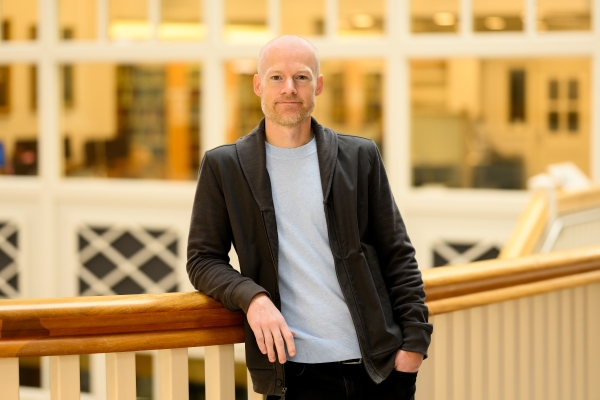Dan Johnson Awarded National Science Foundation Grant The collaborative grant will be used to build a transformative educational assessment of creative thinking for STEM education and research.
Dan Johnson, professor of cognitive and behavioral science at Washington and Lee University, is part of a collaborative team that will receive a $2.5 million, five-year grant from the National Science Foundation (NSF) to study the effect of creativity in science, technology, engineering and math (STEM).
Johnson will serve as co-principal investigator and will work alongside researchers from Georgetown University, the Pennsylvania State University and the University of San Francisco to provide large-scale evidence that creativity is critical to STEM success in college and beyond.
“Creativity is among employers’ most valued skills, and it is critical to the global innovation economy, and yet it is frequently undervalued in U.S. educational institutions,” said Johnson. “It is challenging to reliably and efficiently assess creativity. We have already created and will further develop computational algorithms that automatically assess creativity in transparent and explainable ways. We hope the project will help elevate creativity’s importance across all STEM disciplines and beyond in our educational institutions.”
Johnson’s project has three primary objectives. In the first aim, the research team will investigate how core dimensions of creative cognition (visual, verbal, generative, evaluative) relate to future STEM success in a three-year longitudinal study. The second aim will test computational creativity scoring models and determine which best predicts human creativity ratings as well as which of those computational models best predicts future college and post-college STEM success, parsing the relative contributions of verbal and visual creativity. The third aim will test computational creativity scoring approaches to predict college STEM success, using a large-scale data set of college applicants as a testbed.
“There’s so much about this research that excites me,” said Johnson. “There are opportunities to engage students in many facets of this project, including data science techniques like natural language processing, where we take the text from creative responses and turn them into numbers and insights about creativity in STEM. We will also study hybrid human-AI techniques to enhance creativity and its relation to success in STEM and will seek to learn what aspects of creativity go beyond predicting GPA and financial success – things like community engagement, prosocial careers, perceived social mobility and belongingness to an organization and the STEM field generally. This will all be used to develop new computational techniques that take a creative product as input and then automatically output creativity scores.”
Johnson also received a collaborative grant from the NSF in 2022 to fund building a free web platform to automatically compute creativity scores for educators and researchers. The platform is expected to launch publicly within the next few months.
Johnson joined the W&L cognitive and behavioral science faculty in 2009, and he currently serves as the program head for data science. He holds a Bachelor of Arts degree in psychology and biology from Luther College and a doctorate in psychology from the University of Oklahoma.
If you know a W&L faculty member who has done great, accolade-worthy things, tell us about them! Nominate them for an accolade.
 Dan Johnson, professor of cognitive and behavioral science
Dan Johnson, professor of cognitive and behavioral science
You must be logged in to post a comment.